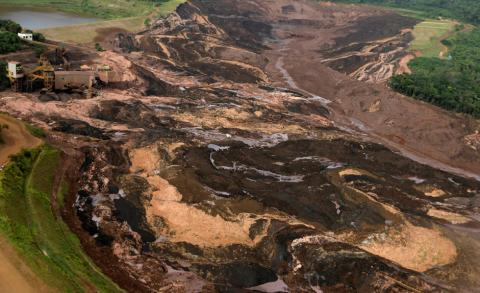Advertisement
Hundreds missing after Vale dam burst at Brazil mine, seven bodies found
BRASILIA/RIO DE JANEIRO (Reuters) - Brazilian rescuers were searching for some 200 missing people after a tailings dam burst on Friday at an iron ore mine owned by Vale SA, the second major dam disaster involving the company in just over three years.
Seven bodies had been recovered by nightfall, said Avimar de Melo Barcelos, the mayor of the town of Brumadinho where the dam burst in the mining-heavy state of Minas Gerais.
The toll was expected to rise sharply.
Vale Chief Executive Fabio Schvartsman said only one-third of the roughly 300 workers at the site had been accounted for. He said a torrent of sludge tore through the mine's offices, including a cafeteria during lunchtime.
Minas Gerais is still recovering from the collapse in November 2015 of a larger dam that killed 19 people in Brazil's worst environmental disaster. That dam, owned by the Samarco Mineracao SA joint venture between Vale and BHP Billiton, buried a village and poured toxic waste into a major river.
Schvartsman said the dam that burst on Friday at the Feijao iron mine was being decommissioned and had a capacity of 12 million cubic meters – a fraction of the roughly 60 million cubic meters of toxic waste released by the Samarco dam break.
"The environmental impact should be much less, but the human tragedy is horrible," he told journalists at Vale's offices in Rio de Janeiro. He said equipment had shown the dam was stable on Jan. 10 and it was too soon to say why it collapsed.
Television footage showed a vast swathe of thick red mud scarring the verdant hills below the mine, cutting through farms and residential areas and leveling everything in its wake.
Fire brigade spokesman Lieutenant Pedro Aihara said the torrent of mud stopped just short of the local Paraopeba river, a tributary of Brazil's longest river, the Sao Francisco.
"Our main worry now is to quickly find out where the missing people are," Aihara said on GloboNews cable television channel. Scores of people were trapped in nearby areas flooded by the river of sludge released by the dam failure.
Helicopters plucked people covered in mud from the disaster area, including a woman with a fractured hip who was among eight injured people taken to hospital, officials said.
The Inhotim Institute, a world-famous outdoor contemporary art museum a few miles from downtown Brumadinho, evacuated visitors and closed its doors out of precaution.
PARAOEBA COMPLEX
The Feijao mine is one of four in Vale's Paraoeba complex, which includes two processing plants and produced 26 million tonnes of iron ore in 2017, or about 7 percent of Vale's total output, according to information on the company's website.
Feijao alone produced 7.8 million tonnes of ore in 2017.
Brazil's recently inaugurated President Jair Bolsonaro dispatched three ministers to survey the disaster area and will visit himself on Saturday, his chief spokesman said.
Former environmental minister and presidential candidate Marina Silva said Brazilian authorities and private miners had not learned anything from the 2015 Samarco disaster near the city of Mariana and called it unacceptable.
Operations at Samarco remain halted over new licensing, while the companies have worked to pay damages out of court, including an agreement that quashed a 20 billion reais ($5.31 billion) civil lawsuit last year. Federal prosecutors suspended but have still not closed an even larger lawsuit.
"Three years after the serious environmental crime in Mariana, with investigations still ongoing and no one punished, history repeats itself as tragedy in Brumadinho," Silva said on Twitter.
Iron ore prices are likely to rise in the wake of the disaster as there may be less supply on the market for the short term, said Chris LaFemina, a Jefferies mining industry analyst.
That could boost the share price of rivals Rio Tinto Plc and Anglo American Plc, while weighing on Vale, he said. U.S.-listed shares of Vale closed 8 percent lower on Friday.
"While we hope the reports of fatalities are inaccurate, we do believe this is a material negative for Vale," LaFemina said. "The full extent of the damage and the potential impact on iron ore markets are not clear."
Schvartsman declined to comment on how output would be affected.
(Reporting by Anthony Boadle in Brasilia and Marta Nogueira in Rio de Janeiro; Additional reporting by Ricardo Brito and Jake Spring in Brasilia, Ernest Scheyder in Houston; Writing by Brad Haynes; Editing by Daniel Flynn, Chris Reese and Sonya Hepinstall)



















Add new comment